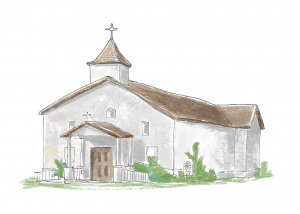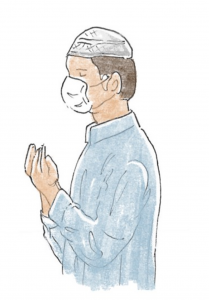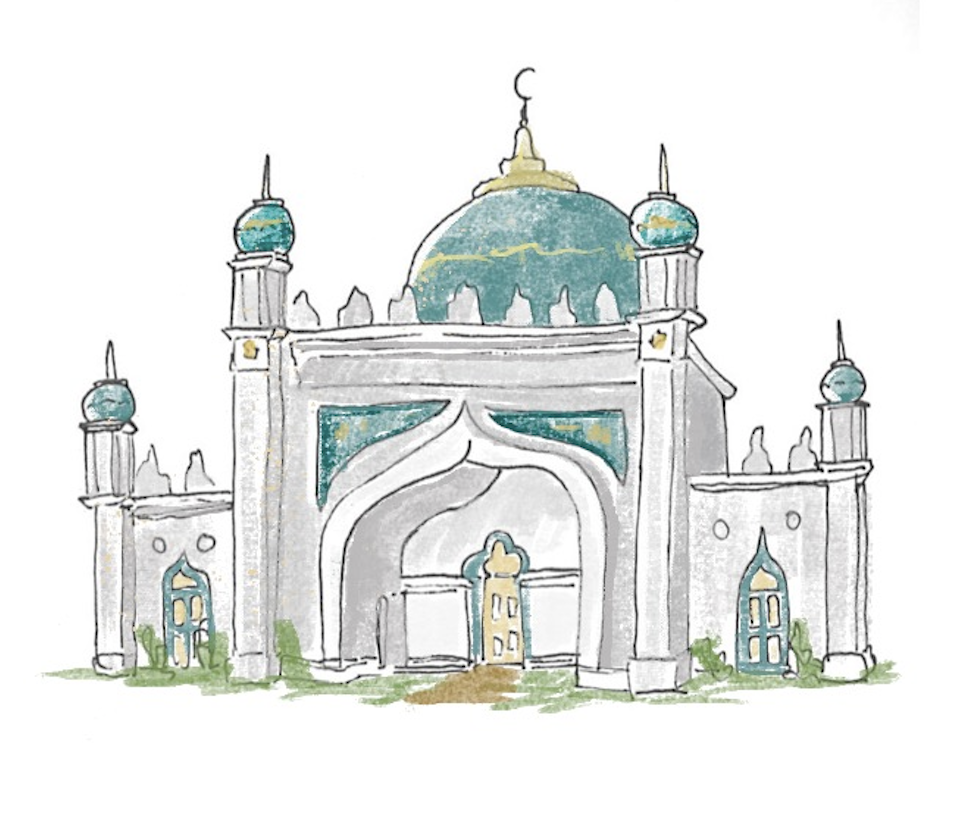Palo Alto High School sophomore Abdullah Naviad recalls kneeling on a patterned prayer rug with six feet of space surrounding him, reciting his prayers in the sun-beaten asphalt lot of the Mountain View Palo Alto Musallah — an unrecognizable scene to pre-pandemic Mosque attendees.
Naviad is one of countless people of faith in Silicon Valley whose religious practices have been disrupted by the COVID-19 pandemic. From shelter-in-place orders to bans on indoor gatherings, COVID-19 safety regulations have restricted the ability of followers of all religions to attend churches and temples, conduct communal prayers and celebrate religious holidays.
These restrictions have sparked legal battles and debates in the U.S. over whether the severity of COVID-19 safety regulations should be indiscriminate or flexible to the needs of religious practitioners, who may be especially reliant on their faiths during this uncertain and unprecedented time.
Religious regulations
Last summer, California Gov. Gavin Newsom prohibited indoor worship services in purple-tier counties, the most restrictive of California’s color-coded system based on COVID-19 conditions. In response, numerous lawsuits were filed challenging the stringent new restrictions.
In February, the U.S. Supreme Court ruled in South Bay United Pentecostal Church v. Newsom that California could not enforce its ban on indoor church services and had to reduce the severity of the restrictions to the level of essential businesses such as retail stores and shopping centers.
“The pandemic is something that has impacted us all. We can find hope within all the turmoil.”
—Eleanor Wong, senior
This case, and the more recent ruling against California’s restrictions on at-home religious gatherings in Tandon v. Newsom, which took place this April, has spurred debate over whether religious services should be deemed an essential business.
“While my religion and the worship that we do is very important, I do not think that churches should be exempt from COVID-19 regulations,” wrote practicing Christian and Palo Alto High School junior Harin Kim in an email to Verde.
When California’s ban on indoor church services was lifted, Kim’s church did not rush to return to normalcy.
“While our church has been allowed to do in-person sermons, we have waited until it was safe for other businesses, such as restaurants, to have people,” Kim wrote. “I believe that a physical place is not needed in order to take part in worship … It can be done capably over an online platform.”
Community adaptations
Many religious members of the Palo Alto High School community have felt the impact of the pandemic on their respective practices.
Naviad’s mosque has adhered to COVID-19 restrictions by holding prayers in an untraditional location.
“The prayers are held in the parking lot outside due to the building being closed,” Naviad says. “There is a maximum capacity of about 50 people who have to pre-register before coming.”
 Paly history teacher Daniel Shelton, who identifies as Jewish, says the community aspect of worship that existed before the pandemic has been lost in the past year after COVID-19 restrictions have limited gatherings.
Paly history teacher Daniel Shelton, who identifies as Jewish, says the community aspect of worship that existed before the pandemic has been lost in the past year after COVID-19 restrictions have limited gatherings.
“Our synagogue is very singing-based and there’s a lot of choral components,” Shelton says. “Not having the whole congregation singing together takes a lot out of the experience.”
The loss of the community experience that Shelton laments is a major reason Paly students and teachers take part in organized religious activities, as they provide a sense of belonging for many.
Physical education teacher Stacey Kofman, a practicing Jew, says religious gatherings can bring together people who may not be able to see each other on a regular basis.
“Not having the whole congregation singing together takes a lot out of the experience.”
—Daniel Shelton, teacher
“You really miss the connections, especially around the High Holy Days when you see some of these people that you normally don’t see throughout the year, when you sit in a temple,” Kofman says.
While Kim says she understands the need for virtual services right now, she stresses the importance of physical presence and interaction for communal prayer, echoing the thoughts of Shelton and Kofman.
 “It was much better for worship to be in person as you can feel the presence of your fellow sisters and brothers of Christ,” Kim wrote. “I believe that is an important part of worship as it is very community-integrated, and the success of it feeds off the energy of the people.”
“It was much better for worship to be in person as you can feel the presence of your fellow sisters and brothers of Christ,” Kim wrote. “I believe that is an important part of worship as it is very community-integrated, and the success of it feeds off the energy of the people.”
Many student-run religious clubs are also feeling the effects of the pandemic. Despite challenges, however, religious clubs at Paly like the Jewish Student Union and the Christian Club have been continuing to meet throughout the past year.
Sophomore and Jewish Student Union President Arielle Blumenfeld has organized new activities as the club has transitioned online including icebreakers and raffles, in addition to the usual religion-based discussions.
“Plenty of synagogues have programs that have done a lot to make sure that we can have this online platform,” Blumenfield says. “For us, it just means that we’re moving the meeting to online and making sure that programming is more engaging to an online format.”
“You really miss the connections, especially around the High Holy Days.”
—Stacey Kofman, teacher
Paly Christian Club leaders say that moving their club online has improved accessibility to students.
“We are so fortunate to have the technology to continue meeting online,” senior and Christian Club co-President Eleanor Wong says. “I now use technology to go to church, do the club and attend my church youth group. So I think it’s just knowing that people are still there and that we [are] together.”
While the year has been exhausting and tumultuous, Wong says her faith has helped ground her through hardships.
“The pandemic is something that has impacted us all,” Wong says. “But it’s something that we also address a lot as a church. … We can find hope within all the turmoil.”



